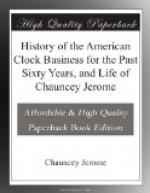hard myself and managed in the most economical manner
possible. In 1825, we built a small factory on
the stream below the shop where I sawed my veneers
two or three years before, but there was no road to
it or bridge across the stream. I had crossed
it for years on a pole, running the risk many times
when the water was high, of being drowned, but it
seems I was not to die in that way, but to live to
help others and make a slave of myself for them.
In 1826, we petitioned the town to lay out a road
by our factory and build a bridge, which was seriously
objected to. We finally told them that if they
would lay out the road, we would build the bridge and
pay for one half of the land for the road, which,
after a great deal of trouble, was agreed to, and
proved to be of great benefit to the town. Our
business was growing very rapidly and a number of
houses were built up along the new road and about
our factory. I should here mention that Mr. Eli
Terry, Jr., when I had got the Bronze Looking-Glass
Clock well a going, moved from Plymouth Hollow two
miles east of Plymouth Centre, (now the village of
Terryville,) where he built another factory and went
into business. His father retiring about this
time, he took all of his old customers. He was
a good business man and made money very fast.
He was taken sick and died when about forty years
old, leaving an estate of about $75,000. His
brother, Silas B. Terry, is now living, a Christian
gentleman, as well as a scientific clock-maker, but
he has not succeeded so well as his brother in making
money. Henry Terry of Plymouth, who is another
son of Mr. Eli Terry, was engaged in the clock business
thirty years ago, but left it for the woolen business.
I think that he is sorry that he did not continue
making clocks. He is a man of great intelligence
and understands the principles of a right tariff as
well as any man in Connecticut. His father was
a great man, a natural philosopher, and almost an
Eli Whitney in mechanical ingenuity. If he had
turned his mind towards a military profession, he would
have made another General Scott, or towards politics,
another Jefferson; or, if he had not happened to have
gone to the town of Plymouth, I do not believe there
would ever have been a clock made there. He was
the great originator of wood clock-making by machinery
in Connecticut. I like to see every man have
his due. Thomas and many others who have made
their fortunes out of his ingenuity, were very willing
to talk against him, for they must, of course, act
out human nature. Seth Thomas was in many respects
a first-rate man. He never made any improvements
in manufacturing; his great success was in money making.
He always minded his own business, was very industrious,
persevering, honest, his word was as good as his note,
and he always determined to make a good article and
please his customers. He had several sons who
are said to be smart business men.




